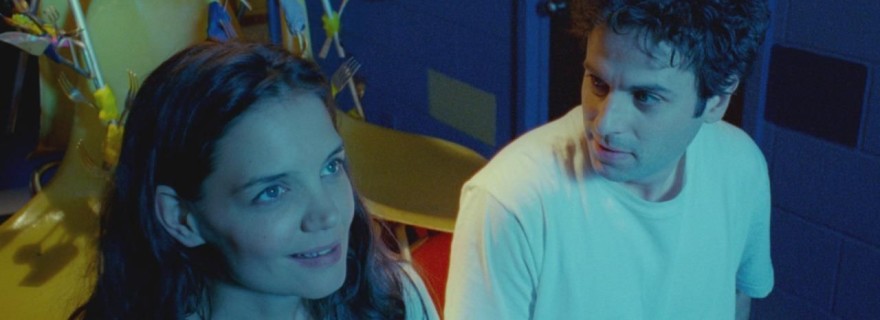'Touched with Fire'
Movie Rating:
2.5
Walking an uncomfortable line between probing and preaching about a valid issue, ‘Touched with Fire’ starts strong and establishes some intriguing characters before losing its way pounding home a thesis.
The film is about bipolar disorder, specifically how artists frequently thrive under the illness. It’s clearly a passionate and even personal subject for first-time feature writer/director Paul Dalio, who shows off some talent, but he just might be a little too close to this specific issue to explore it through narrative. The movie is not without points of interest, but it’s tough to watch the potential of the picture slowly fizzle out.
Katie Holmes and Luke Kirby star as Carla and Marco, a pair of artists hindered and inspired by their bipolar issues. Carla is a published poet who goes on book tours, while Marco is a street hip-hop dancer who has a hard time getting through his daily life. The film opens with the duo spiralling into uncontrollable manic episodes that lead to each of their parents committing them into a hospital. They meet in group therapy and initially feud before falling in love, like most movie couples do. Their love is formed in wild manic nights sharing bizarre notions about the universe, until their doctors pull them apart. However, after being released, they meet up again and become a couple, embracing their illness with their art. Eventually, an argument builds between the pair, with Carla convinced that medication could help her life while Marco refuses to believe any good can come from dulling his creativity with pills.
For the first hour or so, ‘Touched with Fire’ works rather well as a cracked and bizarre love story. Dalio finds nice ways to visualize the illness. The characters’ manic meltdowns are filmed with unpredictable swooping handheld cameras, while their medicated hospital experience is played in locked-down frames. When they get out of the hospital, the visuals mix both techniques rather beautifully to match their shared extreme mental states.
Performances are strong. Holmes’s natural nervous energy suits her flighty character, while Kirby manages the difficult task of grounding a character who naturally bounces around the screen spitting out monologues. Around the edges, character actors fill out the naturalistic ensemble with some impressive work, especially from the perpetually underappreciated Griffin Dunne (‘An American Werewolf in London’, ‘After Hours’) as Marco’s father. For a while, it feels like the movie might turn into a moving romance with a little extra something on its mind.
Then Dalio loses the thread. He lazily indulges in cheesy Nicholas Sparks romantic imagery, and the endless pontification about the relationship between artistry and bipolar disorder stops feeling like human speech and more like textbook writing. The film’s title comes from a non-fiction book by Kay Redfield Jamison, and eventually the movie starts to feel more like an adaptation of that academic text than drama. Redfield even shows up for a cameo to preach directly to the characters, and at that point it becomes difficult to take any of the drama seriously. There’s nothing wrong with using fiction to explore deeper thematic concerns, but if the story gets lost in the sermon, the point is diluted.
‘Touched with Fire’ is a frustrating viewing experience. It starts off with so much promise until it spirals out of control, feeling more like a classroom case study than a movie. There’s a self-importance to the proceedings that gets rather icky, particularly when Dalio closes this movie with a dedication to famous bipolar artists name-checked in Jamison’s book. There’s little in the film to suggest these characters are artists even remotely close to the people the filmmaker overtly draws comparison to, so the final statement only highlights the failings of the film rather than bringing the message home.
It’s a shame that Dalio lost faith in his narrative. He came so close to delivering the movie he was shooting for, but got lost in hammering his theme home. Hopefully that’s a lesson he can learn from before his next feature. The filmmaker clearly has talent. He just needs to pick a subject that he can tackle from more of a distance.



